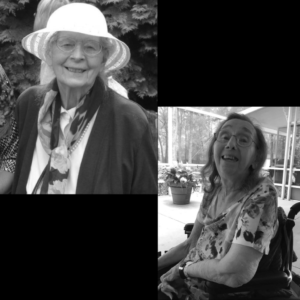Same Family, Different Endings: A Stark Comparison in Aging
by Melissa Overbury-Howland, ISR Staff
I never imagined that two people could have such different aging experiences within the same family.
At 89, my British grandmother lived in the comfort of her home near London. Bought in the 1960s, her house was lovingly tailored: every room held our pictures, a trinket attached to a memory. My grandfather’s greenhouse still stood at the bottom of the garden, and my Nanny took great care in laying out her Denby tea set beside some biscuits every time we visited.
Nanny walked slowly, but she knew every step of her house. Social Services installed a walk-in shower, railings throughout the house, and a lift chair to reach the second floor; she hired a weekly cleaner and gardener and arranged food delivery. She was a coeliac, so courtesy of the National Health Service, she received special food free of charge and had a district nurse come to her home regularly to ensure she was well. She was sharp, laughed a great deal, and enjoyed life. She was happy.
In 2016, she took a nasty fall, which knocked her confidence to live alone. She decided it was best to move into a care home where she could have more support and safety. She passed away at 90, ten months after leaving her home.
My American grandmother sadly did not share the same happy story. Grandma lived in Florida and was admitted to a long-term rehabilitation center in 2012 at 82 after a hip fracture. She was placed in a shared, bare-walled room with an old TV and dusty blinds. She never returned home. Instead, she lived out the rest of her life in full-time care facilities.
The level of neglect she endured is maddening, and I still grapple with the fact that I understood the abuse too late. The incidents were many and ongoing, some as simple as not giving her a daily wash, even of her hands and face. 2015 however, was the turning point. After repeatedly pressing the call button for nearly half an hour and it being ignored, my grandmother walked to the bathroom, slipped, and fell onto the tile floor. She was in extreme pain. It took another 20 minutes before someone answered her call button.
After that, Grandma became entirely bedridden as osteoporosis took its toll and walking became too risky. She would watch television or chat with anyone who would care to listen. But then, those activities were robbed from her. At the age of 85, Grandma’s hearing loss became the most isolating factor of her aging. We would sit at her bedside, but no amount of shouting would help drive a conversation. Finally, we resorted to writing, but that quickly became too cumbersome, as her eyesight started deteriorating too.
By the final year of her life, Grandma was barely there. She had lost her hearing, her eyesight, and her ability to move, and finally, she lost her cognitive abilities. Visiting became painful as dementia settled in.
In 2019, Grandma passed away, also at the age of 90, having lived out the last decade of her life in what was essentially a shared hospital room.
Same family, different endings. The contrast is stark, and to me, it stemmed from the lack of resources available to my American grandmother. I am not here to toot the British health care system but rather expose the gaping absence of coordinated care that should be available.
I ask myself: What if we had had access to a care manager or could have afforded the equipment to keep my grandmother in her home? What if a caregiver could have checked in on her or there had been an organization to deliver my grandmother’s meals or provide transport to medical appointments? If such resources did exist where she lived, we were never told about them.
The contrast shouldn’t exist. Island Senior Resources should not have to exist. But there are too many gaps in care that should be a basic human right: to age gracefully, to deserve respect in old age, and to maintain a sense of dignity even through our ailments.
If what we do here at Island Senior Resources improves even one person’s aging, we are doing it right. For assistance, call us at 360-321-1600 or 360-678-3373.

